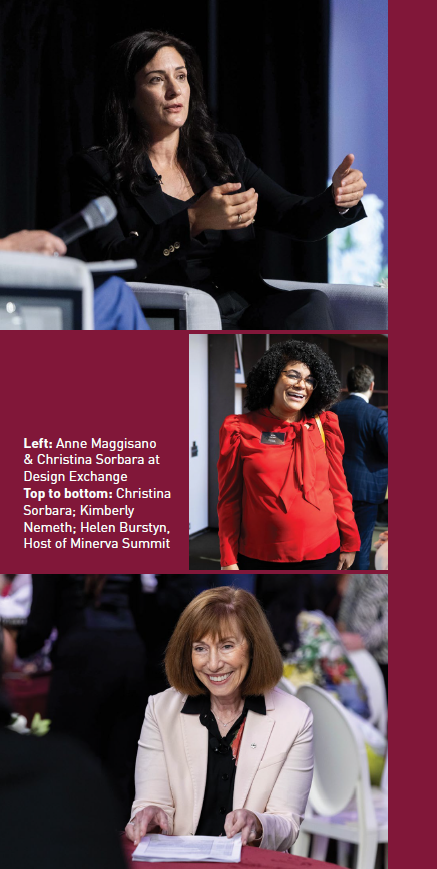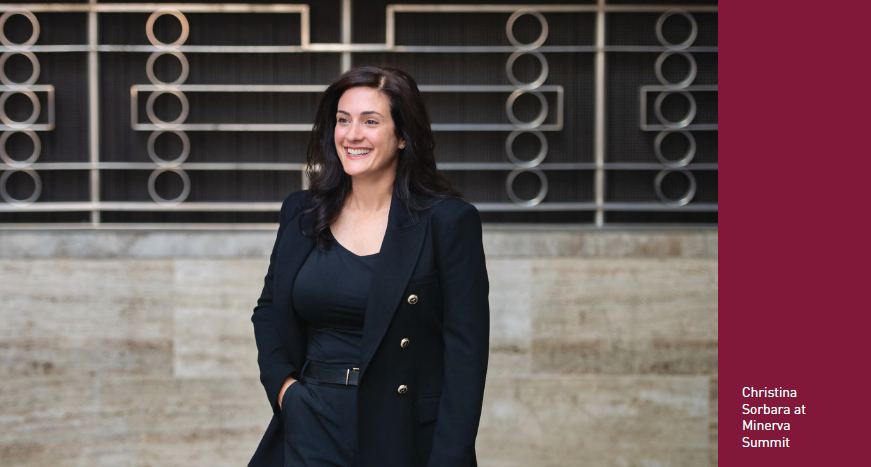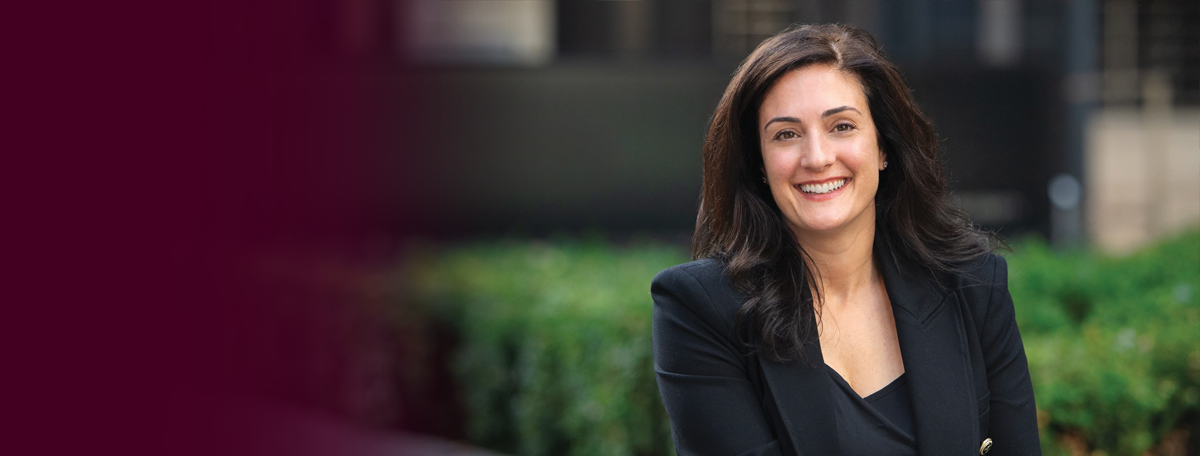As a third-generation wealth holder and parent to the fourth generation, Christina Sorbara understands the responsibility of managing wealth, which involves navigating family legacy, philanthropy, and future planning.
Beyond her role as an executive and board member of Sorbara Group of Companies, her family’s 80-year-old real estate business, Sorbara oversees generational wealth transfer in her family. She also chairs the multi-family charitable foundation as well as her own personal charitable foundation. Additionally, through her consulting firm, she guides other families on the giving process. Sorbara shared her approach to wealth stewardship at the inaugural Minerva Summit during a conversation with Burgundy’s Anne Maggisano.
HIGHLIGHTS FROM THE CONVERSATION:
- Leading generational wealth in a family
- Finding a path to financial stewardship and responsibility
- Teaching your children about financial literacy
Anne Maggisano: Welcome, Christina. We have known each other for a long time, and I’m so excited to be in conversation with you here today because you are such a shining example of what it means to take a leadership role around wealth. What was the catalyst for you to take a lead role around your wealth, and why does being a leader in this area mean so much to you?
Christina Sorbara: I’m a competitor at heart. I want to be better every day. I want to push myself. That’s the value that I was born into and one that I’ve grown inside myself. But when you have a child who is born into a family with multi-generational wealth, you are blood-linking them to ultimate financial stewardship and responsibility. They have no choice. So, from my perspective, why not start young so they can understand and build financial acumen before they get to the moment where [their choices are] going to have consequences? I remember thinking about those consequences as a young child, but the first time I had the experience of my financial decisions having consequences was when I got married and had to sign many documents. There was no going back after that. I am constantly having to make financial decisions. Who better to lead my financial decisions than me? I’m not going to give someone that control.
AM: What did your dad do to prepare you to take a leadership role with your money?
CS: My father was a mastermind—he still is. There are several things that he continues to do to this day that have helped me, my siblings, and my cousins. One of them was to introduce us to advisors—lawyers, accountants, financial advisors—at a very young age so that we could understand the scope that we needed to manage wealth. Even though our decisions weren’t weighted, at least we got to meet people and understand what questions to ask. He didn’t direct us.
But the key to making this effective was that he was also available to go over statements and discuss any questions we had. Why would you invest here? What do you think about this advisor? When you have children, you realize that in very uncomfortable situations—and financial questions are uncomfortable—the value of time is all that they want. They want to feel safe. They want to feel supported. He offered that to us and he still does.
He also introduced us to philanthropy at a young age, and this is the one area that I gravitated to the most. And it was all about the [questions and] decision-making around philanthropy; not just “give the money here,” but “why?” Where and how do you invest the money before it goes to charity, and what is the impact? That is something he learned from his own father that he passed on to our generation, and that we are passing on to the fourth generation. And the lesson is acknowledging the responsibility of wealth: when you have an abundance there is a responsibility to help others in some capacity.
AM: And how about your mom? How did she impact you when you think about your role?
CS: My mom’s attributes are equally as important as my father’s. My mother taught us the importance of relationships and how to nurture them. And I’m not just talking about my own family; we are a multi-generational, multi-family company. If you don’t have a relationship of trust, how are you having conversations about intergenerational wealth and money? There’s no way you could have them.
I can proudly say that across the generations and families, we all know each other. At the end of August, we had our third and fourth generations together—27 family members who wanted to be together. And last fall, we had 15 people from three generations working together to produce 300 jars of tomato sauce. The on-the-spot coordination and communication that was needed to get that done could be its own case study of building relationships.
AM: From what you’ve described, Christina, your parents really set the foundation for you to thrive in this area. And yet, when we were preparing for this conversation, you shared with me that you have often been told: “Don’t worry, I’ll take care of it.” Can you explain how this messaging has impacted you?
CS: I believe those words can, on the one hand, feel liberating, but, on the other hand, can be limiting your ability to make learning a priority. I heard that phrase growing up a lot, and there was a point where I was like, “Okay, that’s enough. I don’t want to hear that anymore.” But I also know I enabled a lot of that kind of thinking. When you’re younger, it’s easier to have a parent or an advisor say, “Don’t worry, I’ll take care of that for you,” because you don’t know, because you’re uncomfortable speaking up, or it’s a tough decision and you haven’t had the education to make that decision. You have to understand that with every tough decision you’re not making, you’re not learning. I chose to be the one to advance my financial journey and make learning a priority.
About 20 years ago, I went back to work in our family business after working in other places. I was working in our property management department as a property manager. There were other property managers, but my job description was different from their job descriptions. I didn’t know that. I thought we were all doing the same things—changing doors, changing locks. But the riskier parts of the job, the dirtier parts of the job, I wasn’t being given. And when I realized this, I asked my boss, who wasn’t a family member, “Can I have that opportunity?” I could see the wheels in his brain thinking, “Am I supposed to do this? Maybe I shouldn’t give this to her.” His boss was my father. But I was very persistent. I said, “Please, I really want to try. I want to get full job experience.” Well, next thing you know, it’s 3 a.m., I’m in Scarborough with a locksmith, changing the lock on a tenant, and alarms are blaring. My heart was racing. I remember getting back into the locksmith’s van and sliding the door shut. That was a pivotal moment. It was like I was no longer going to let someone take care of things for me. Ever since then, in whatever arena I am in, I make sure I get into the room and make those decisions. And if I don’t know [what to do], I make sure I have someone there to help me.
AM: I think so many of us can relate to this messaging, especially as women in wealth, because of the social, cultural, and historical norms around gender roles as they relate to money. How did these norms play out in your family?
CS: I still face it every day. We all face cultural and gender norms. It’s a reality of the world. For me, I thought to myself: “Do I want these embedded norms to define my future?” That would be the easy route—you go with the status quo, and you think you are all good. But I chose to redefine those norms [within my family and business] so that I could define my future the way I wanted my future to be. Is it hard? Yes. Do you have to go home and inflate yourself up every day? Yes, you do. But who’s going to do that if not you for your own life?
I also think about my children. I want them to explicitly know that women can take a lead on wealth. Women can make financial decisions. Women can be up here. They don’t need to find a man to make those decisions for them. You just have to have agency to make those changes. And you can find allies for that, you don’t have to be alone anymore. My grandmother would have had to have been alone. Today, you can find groups and people who think and breathe the exact same way as you do and can help you to make the change.
Often when I talk about this subject, I think about my paternal grandfather, who came to this country over a century ago. I think he’d be surprised to know I was up here. He would be surprised about a lot of things I do. But he’d be so proud because of the values of resilience and determination that I need to recommit to every single day. Those are the exact same values that he had to have when he came to this country selling hotdogs on the corner and building a family and a business. When you drill down to it, we are guided by the exact same values.
“Women can make financial decisions. Women can be up here. They don’t need to find a man to make those decisions for them. You just have to have agency to make those changes.”
AM: That’s such a great lesson. What are the strategies that you use to thrive as an agent over your wealth?
CS: We have so many decisions every day that we need to make. One of the key strategies is to have a personal team. Who is on your immediate personal team and makes you feel safe and supported? With whom are you free to make mistakes? And it is also key to have the courage to change that team, to ask the hard questions, to put yourself at a table with people that make you uncomfortable.
One of the strategies I teach my kids is this concept of the 100-hour rule. I tell them that if they do something 16 to 18 minutes a day for a whole year, they’re going to be 95 percent better than the other people in the room with them. And the notion or purpose behind this strategy is not to become a financial guru. Rather, in doing this, you are now going to have the confidence to ask the questions, the confidence to pick up the call from the advisor, and the confidence to bring your child to learn from experts today. This concept empowers me.
AM: I want to dive deeper into your investing journey. How did you go from being passive to being active in this area?
CS: The start of my journey was, as I said, my father introducing us to advisors when we were young. It also meant coming to educational events like the [Minerva Summit]. Over 20 years ago, I took an introduction to investing class with Tony Arrell at Burgundy. He was a great teacher.
It was one of your Women of Burgundy events, Anne, in 2015, that inspired me to take the next step. After that event, I opened my first account to learn how to engage directly with the firm and with the markets. I wanted to explore what it could mean to be an investor. At that event, you said something that stuck with me. It was the fact that because the women were in the room taking time out of their day to learn about their financial journey, they were one step closer to taking agency. I remind myself of that all the time because there are moments where I have something on my desk and I just don’t do anything with it because it makes me uncomfortable. Then I remember: “Okay, maybe next week. I can do this. I know I can. I’m not the same person I was in 2015.” Trust yourself. And if you make a mistake, learn and adjust.

AM: How would you describe your approach to the relationship you have with your advisors?
CS: My relationship with my advisors is very transparent. Be very direct, be very transparent with what you want and need, and manage that outcome. They’re the experts, they’re going to help you get it. You leverage their expertise, but you have to be the one who takes control and manages the relationship.
I remember a long time ago not really understanding that and taking more of a passive approach. But when you take a passive approach, you can’t get upset with your advisors when they don’t achieve what you want. You didn’t even tell them what you wanted in the first place. So, I think you have to really work with your advisors to achieve your desired outcomes. And don’t be afraid to change advisors if they’re not working for you. There are a few advisors I have who my father and brothers don’t have. For the relationship to work, you have to be able to relate at a human level. So, if the relationship is not there at a fundamental level, change.
AM: When you think about your relationship with your children, what are you doing the same as your parents when they were nurturing you in wealth? Or what are you doing differently?
CS: I’m trying to follow a lot of what my parents taught me. But one of the main differences is I’m starting with my kids very young and getting them involved in anything financial that crosses their path. My kids are 11, 10, and 10. You can imagine the ideas they come up with around money. They see it on YouTube, and they want to figure it out and talk about it—anything from fundraising to stocks, and even crypto. We invested a small amount in crypto so they could see and experience it for themselves. They experienced that big downward dip in crypto and asked, “What does that mean? Is it ever coming back?” I try to answer [any questions] as best as I can.
My job when they come up with these ideas is to encourage the conversation. I want to validate their thinking. And I want to make sure I give them time to keep learning how to relate to money. They don’t even know that money is paper anymore. It’s tapping on a phone now. We need to remind them.
One of the other things I do with my kids is talk about our business a lot. I want them to understand the history. Our business has been around for 81 years. I have a goal of making it to 100. By the time we get there, how far removed are they going to be? Who is telling those stories? Are they even going to work there?
The latest, Anne? The other night my kids said, “I think we need Taylor Swift to come over. We’re going to take a selfie. We’re going to put it on your company Instagram page, and we’re going to get hundreds of thousands of followers. See what happened with the football player?” I don’t want to let them down, but it’s probably not going to happen. But, with that said, the importance of me telling the story is that they are already thinking and connecting things like Instagram, more followers, more money. They are already having these thought processes at such a young age. Those thought processes are something that I don’t want to shut down. Because I think it’s going to be beneficial for them.
AM: What a gift you’re giving them by introducing them to the fundamentals of business at such an early age. When we were preparing for this conversation, you said that the measure of our success today would be if there were tangible takeaways for our guests. Do you have any final words?
CS: I will sum up what we said in three points. First: We all understand that we can take a lead in our wealth—whatever size that means—and feel confident in our ability to ask questions. Another point would be to build yourself a team—and if you don’t know who should be on that team, ask someone. Come ask Anne; she can help you figure out who is on that team. Then be transparent with that team. And finally, I would end with that philanthropic lesson that my grandfather passed on to me, which is that when you’re blessed with an abundance of wealth, you’re also equally responsible to give back in some capacity.

This post is presented for illustrative and discussion purposes only. It is not intended to provide investment advice and does not consider unique objectives, constraints or financial needs. Under no circumstances does this post suggest that you should time the market in any way or make investment decisions based on the content. Select securities may be used as examples to illustrate Burgundy’s investment philosophy. Burgundy funds or portfolios may or may not hold such securities for the whole demonstrated period. Investors are advised that their investments are not guaranteed, their values change frequently and past performance may not be repeated. This post is not intended as an offer to invest in any investment strategy presented by Burgundy. The information contained in this post is the opinion of Burgundy Asset Management and/or its employees as of the date of the post and is subject to change without notice. Please refer to the Legal section of this website for additional information.

